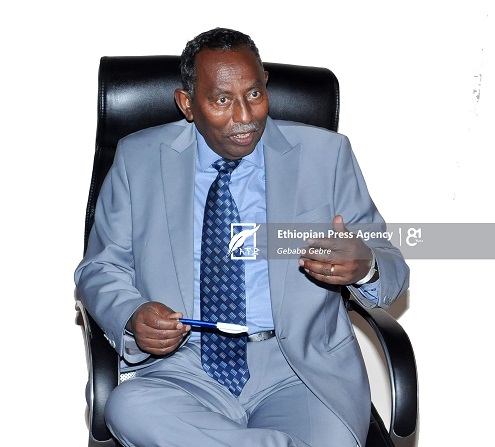
Our todays’ guest, Belete Beyene, was born and raised in Harar. He completed primary and secondary education at Harar Model and Medhanialem Schools. Right after graduating from high school, he was recruited by Ethiopian Airlines to attend a piloting course.
But he quitted the training considering that getting involved in any kind of business is more lucrative than being a pilot. He started to build his capacity engaging in various sort of jobs. At the same time, he joined the Addis Ababa University and earned a bachelor degree in Business Administration. Belete holds a second degree from Holland Public Enterprise University. While he was a student, Belete worked as a marketing consultant for the Ethiopian Food Research Institute. In collaboration with the Swedes, the institute conducted a study on child nutrition. In 1977, he established the Fafa Food Factory, which can produce 12 tons of nutritious food with the support of various donors and the Ethiopian government. He has worked hard to make the factory a major player in addressing food shortage in Ethiopia. By then, the demand for Fafa food has increased to 24 tons. He has worked day and night to make the factory a leader in food production not only in Ethiopia but also in Africa. Belete has made a significant contribution to substitute imported nutritious foods. He also built the first ever food laboratory in the country’s history. He helped the factory prove its solidarity with those displaced due to the 1985 famine and those affected by malnutrition. He had an immense contribution in upgrading the factory’s production capacity to 34,000 tons per year and saved two million lives until foreign aid reached those in the famine. The European Parliament bestowed a special award for him considering the excellent job. In collaboration with various countries, he has produced milk and other nutritious foods accessible to the public. It is also said that he is a pioneer in the food industry. He also worked as a manager for the Ethiopian Textile Corporation for two years when the country faced an export crisis. Though he made significant contributions to the development of the country and the sector for 19 years, he was forced to leave the factory following the change of regime in 1991. However, he did not give up. Raising funds from donors, he opened the first ever private health food factory. In the past, he has imported ingredients for Fafa in collaboration with the Agricultural Research Institute. In particular, he is well known for multiplying unadulterated Ethiopian soybeans in all government farms.
The factory continues to produce up to 750 quintals of soy cake and fodder products daily. He also has managed to own the first soybean factory, and started to cooked food jointly with UNICEF for droughtaffected and displaced people.
In addition, due to the Ethio-Eritrean war, the iodine mixing process in Assab was interrupted. Importing salt from Afar, he was distributing iodized salt to the community. Even if he transfers part of the company to his children and to a French company; he is producing an internationally recognized food staff and is providing lab service. He is working tirelessly to assist government development programmes.
The Ethiopia Press Agency conducted an interview with Belete Beyene, Chairman of the Board of Directors of the Family Food Industry and Owners and ManagingDirector of Bless Laboratory, about his life experience and various national issues.
Have a nice read. Could you tell us about the incident that you decide to engage in this business?
When I was an eighth grader, I earned income helping tourists as a translator.
Especially, I loved business from the bottom of my heart and I have a dream of being big; I left the Ethiopia airlines and went to university to study business. Even if I joined the university, I was not idle, rather I used to generate income to myself. The Ethiopian Food Research Institute was for instance one of the institutions I worked at when I was a student. As soon as I finished school, I was hired in the same institution and continued to work there. As I was so quick to learn and enthusiastic, it didn’t take long for me to climb up the administrative ladder.
The institute assisted me to become more aware about the industry and to use my knowledge and expertise for national development. So the food industry development started there in 1992 and continued even after I was fired and established what we see now. In fact, I started the business with a small amount of capital and manpower. The tasks started via importing soybeans and producing milk and enrich foods.
It had been developing its capacity producing iodized salt, enrich foods, Teff and other agricultural products adding values. The factory was expanded by the fund gained from UNICEF and the land obtained from the Oromia State and it became the sole enrich food producing company.
The basic ingredient of our products is peanuts. We usually get it from Harar and Metekel areas. Due to low supply inputs, the factory has had to import it. Similarly, we for instance import soybean oil for factory use.
In any case, we have the support of the government as we imported inputs free of tax and brought in foreign currency to cover the cost. Our company is currently producing vegetable meat. Recently, in collaboration with UNICEF, we built a flour factory for subsidizing the school feeding program. Similarly, we also produce peanut butter- free from aflatoxin problems and deliver it to big hotels and cafes. At the same time, we have been conducting research in Teff together with farmers and we are preparing to supply for foreign market keeping its natural value.
Your organization is a pioneer in establishing the first ever private food lab. What contribution has the laboratory made to the country in this regard? There is something in our culture. After Injera and Wot are prepared and served. The husband first feeds the wife for two reasons. One is to show respect and love for his wife and to prove that it is pure.
Therefore, if any food is not safe, the consumer cannot eat it. The chef should be able to enjoy himself first. The food produced at Factory level must be edible by owners. It must be proven to be pure.
But I do not think that every factory takes this into account. There is an absence of quality everywhere. Most producers are giving us food that they do not eat. Therefore, a laboratory is needed to confirm this. Also, the products we export must be tested in a laboratory to ensure safety.
As we are able to build an internationally recognized and certified institution, it will have great significance to the nation. It helps our products globally competitive apart from filling gaps observed in this regard. Moreover, the laboratory has made a great contribution to promote the Hlina Food Factory worldwide. By the way, the Dutch government was very supportive when we construct this laboratory facility. Using this laboratory means saving the lives of the Ethiopian people. Second, it creates a huge opportunity to expand foreign trade.
Has your organization played a significant role in reducing malnutrition in the country?
How extensive is the access? As I told you before, the company led by my daughter- Hlina Food Factory has been producing a lot of produce over the past 20 years. It is playing a key role in substituting most of the imported foods. Of course, we were able to produce this standard product by building a certified laboratory.
The existence of these factories is an eye opener. In particular, we are the only organization in providing nutrient food to the United Nations. But before that, we were importing almost all the nutrients. By then, up to 150,000 tons of food was imported. Some seven more factories were built following our suit. The knowledge that we have begun can be said to spread or expand. Overall, it contributes significantly to the elimination of 75% of imports. It is also the cause to stimulate the agriculture sector producing soybean oil and fodder. It is a great achievement for me to be able to promote the importance of nutrition.
Creating access to nutritious food in itself provides an opportunity for a competent and healthy minded generation. Overall, there are promising signs that the security situation is getting improved. The question you raised in terms of accessibility is difficult for me to answer.
When I was a student, the population of Ethiopia was 24 million. Today, we have reached 120 million. This means, the population increased fivefold. At the same time, it is difficult to conclude that our industries are growing at the pace of population growth.
The factories did not expand to the required level. In this regard, much work has not been done. Our potential is enormous. Many lands are not plowing. We have water resources that can be produced three times a year. However, we did not use it. Therefore, I believe that attention should be paid to such sectors especially for those who are engaged in farming and those who add value on agricultural products. For example, it should be given priority in providing land; there should be special incentives on tax and other matters. Nutrition is a way of nurturing efficient citizens.
It is producing rational thinkers. If we really want to get out of this predicament, we must decide on our priorities. Malnutrition is our biggest problem. As you know, the issue of nutrition is on the agenda of the current African Union summit. Therefore, we need to pay close attention to this area. As I told you before, Ethiopia is a country blessed in natural resources.
As we feed grains, our mental capacity is good. However, all people should be available to all. People with adequate nutrition are more productive and can create opportunities to gradually break the cycles of poverty and hunger. For that, it must be produced in large quantities. The larger our population, the less productive it is. Most farmers now grow on less than one hectare of land.
This is not enough. So, we still have to be able to cultivate our undeveloped lands. When we do this, we can quickly get rid of food allergies. We also need to be able to engage and cooperate with scholars.
How do you assess the task done so far in terms of transforming the industry sector in general and food industry in particular?
This, of course, has already started a little bit. For example, we trained smallholder farmers on how to prepare nutritious food. Fafa Food Factory, in particular, has contributed significantly to the industrial transition by processing soybeans in the industry and producing high quality nutritious food.
Much research has been done both in Fafa and International Food Policy Research Institute. Our current organization also has a strong relationship with farmers. We are also processing Teff and Wheat to export and gain foreign exchange. In addition, with the help of research, the laboratory is preparing to market the long- lived teff powder.
Although there are many agricultural products in Ethiopia, there is a huge gap in the value added industry. If we add value, it can be three to four times as much as it is now, and our efforts to show that as a model can greatly enhance the sector as a whole.
We also need to pass on our knowledge to the next generation, and our main concern is to transfer the knowledge. The industrial transition is crucial for Ethiopia to benefit from its crop. Our country has a climate and ecology that can produce two or three times a year.
If we use this natural gift properly, we will not be deprived of food. Surprisingly, Ethiopia is a country able to ensure food security in the garden system alone. In order to use this resource, everyone must contribute its share as per its level of capacity.
What is the value of a school feeding program in terms of strengthening theTeaching-learning process?
The population is growing, especially in Addis Ababa. And for various reasons, the income of every householder is declining day in, day out. A person expends 30 and 40 percent of his income for food alone. Due to the high cost of living, one could not afford to spend that much.
As a result, students are unable to attend school due to lack of food at home. Many suffer from various diseases. Former first Lady Roman Tesfaye raised the issue again and again and finally launched a school feeding program. Therefore, I think it is a good measure that understands the problem at this stage. Efforts have been exerted to further improve the meal of students.
Overall, the nutrition program plays an important role in creating a healthy society. And I rejoice that we are part of it.
What is your company’s plan to step up the food industry ?
There is a saying: ‘It takes two to tango.” Setting a plan by itself is not an achievement.
The government should help us to realize our plan. As you said Hilina Enriched Foods PLC has been producing 7500 tons of food with the plan of increasing to 15, 000 tons. Basically, we spend 50 percent of our income on reinvestment.
This will be done in collaboration with my family and the French. We are still interested in developing more together if the government really helps us with taxes and other incentives. Particular attention should be paid to agriculture, which contributes 50 percent of its annual growth to the economy.
Moreover, 80 percent of Ethiopia’s population depends on agriculture. Therefore, not only us but also the government must do its part to develop the agricultural and industrial sectors.
There is a need to create an environment that encourages others to engage in the sector. After all, the food industry is a steady source of income for the government, and it deserves special attention.
To that end, the government must provide incentives for those who want to step up the industry. Thank You very much. It is my pleasure.
BY GIRMACHEW GASHAW
The Ethiopian Herald 19 February 2022




